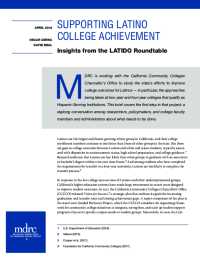Supporting Latino College Achievement
Insights from the LATIDO Roundtable

Latinos are the largest and fastest-growing ethnic group in California, and their college enrollment numbers continue to rise faster than those of other groups in the state. But there are gaps in college outcomes between Latinos and white and Asian students, typically associated with disparities in socioeconomic status, high school preparation, and college guidance. Research indicates that Latinos are less likely than other groups to graduate with an associate’s or bachelor’s degree within a six-year time frame. And among students who have completed the requirements for transfer to a four-year university, Latinos are less likely to complete the transfer process.
In response to the low college success rates of Latinos and other underrepresented groups, California’s higher education systems have made large investments in recent years designed to improve student outcomes. MDRC — in collaboration with the California Community Colleges Chancellor’s Office — launched the Latino Academic Transfer and Institutional Degree Opportunities (LATIDO) project to examine approaches to increasing the transfer and college completion rates of Latino students attending schools that qualify as Hispanic-Serving Institutions (HSIs) in California. Research has demonstrated the value of HSIs as incubators for efforts to promote such achievement, and many higher education stakeholders have called for continued research and dialogue about what colleges are doing to become truly “Hispanic serving.” The LATIDO project builds on this research by examining policies and practices in California HSIs that are organized around cultural responsiveness to Latino student populations.
This brief covers the first step in that project: a daylong conversation among researchers, policymakers, and college faculty members and administrators about what needs to be done. Several key themes emerged: HSIs should work to align goals, commit to diversity, adopt holistic approaches, and collect more useful data. These themes are applicable both to the specific HSI landscape in California and to other institutions across the country that seek to improve the postsecondary outcomes of Latino students.






